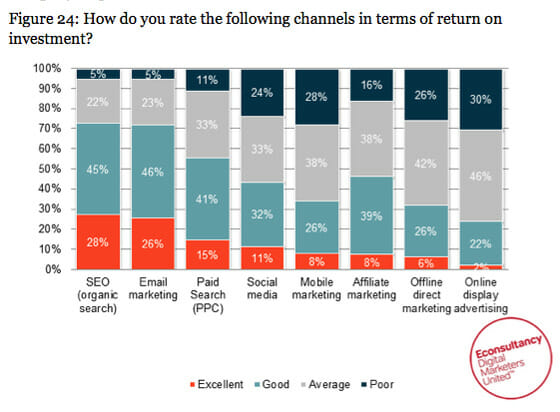A recent Econsultance survey of marketing managers rating channel ROI satisfaction showed that as many as 44% of paid search advertisers had a poor to average return on investment. Overall paid search was rated as a top marketing channel for return on investment as it was rated over channels including social media, display, and affiliate marketing. But for marketers looking to bump that ROI into the excellent category, marketing executives and channel managers should take the AdWords Quality Score Challenge to uncover they can improve their campaign.
Why Most Executives & PPC Managers Do Not Know What Quality Score Is
Let’s face it, when most CEO’s, chief marketing officers, and PPC managers where in school, telephone book advertising was the most effective form of advertising available and there was nothing that resembled today’s sophisticated programmatic search marketing platforms.
Like many other marketing professionals, I’m a big podcast listener. But it is a sad state that even shows in the heart of Silicon Valley like Stanford’s Entrepreneurial Thought Leaders and the Common Wealth Club’s Forums have never mentioned AdWords quality score.
Understanding What Quality Score Is
Google AdWords, the largest search marketing platform rates advertising effectiveness with a quality score rating of 1. Search Ad effectiveness 2. Expected Click Through Rate and 3. Landing Page relevance.
Why Quality Score Matters
Advertisers with the best quality scores pay less than competitors per click, per lead, and per sale. The instrument of quality score helps advertisers make their ads more effective has led to more than 30% of people believing that these paid results are not even advertisements.
In a recent quality score study, Search Light Leads has found that for every point of quality score improvement, there is a corollary 11% advertising spend discount. So an advertiser that spends $100,000 a year on AdWords that improves their quality scores by 3 points could save $30,000 a year.
There are two great reasons why Google gives discounts to the most effective advertisers. #1 Advertisers will spend more money on ads that deliver the best results and cost less. #2 Google search users have better experiences when ads are more engaging. Quality score is an underlying reason why Google own’s over 90% of paid search marketing reach; their results are the most relevant for users.
How To Take the AdWords Quality Score Challenge
AdWords advertisers can take the quality score challenge by averaging their quality scores for their 10 most expensive keywords over the last 30 days. Executives can ask their PPC managers to retrieve this rating of paid search effectiveness, or managers can add quality scores to their keyword report dashboards in AdWords to keep this information visible. Certainly quality score is important beyond the top 10 most expensive keywords, but where the most money is being spent is the most important place to lock in available discounts.
How To Improve Your Quality Scores
Improvements to the three underlying metrics that quality score is based on will lift your score, lower your cost, and improve your advertising effectiveness.
Getting better keyword click through rates is a function of selecting the best search terms to target. Out of your entire search term marketplace, pick keywords targeted for both relevance and popularity. These are your most important battlegrounds to win.
Unlock better ad relevance by split a/b testing multiple copy variations to statistical significance, and successively promoting winners. Also make sure all relevant ad extensions are used to entice engagement.
Landing pages that are aligned to solve the users’ self stated mission are the clincher to unlock the best quality scores. While web page oversight has typically been outside the scope of work that PPC managers have been tasked to oversee, the cost saving contribution of getting them right has become an essential extended responsibility. Pages developed for organic search that rely on broad content appeal typically do not achieve the same results as custom pages for paid search that are specifically aligned to support visitors whose intent is indicated from a narrow query.





